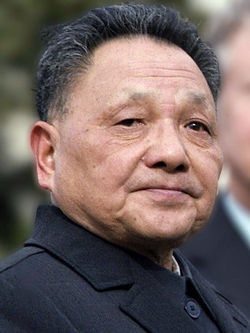
Cause of death: Parkinson disease
157 cm
Deng Xiaoping (Chinese: 邓小平; 22 August 1904 – 19 February 1997) was a Chinese statesman, revolutionary, and political theorist who served as the paramount leader of the People's Republic of China from 1978 to 1989. In the aftermath of Mao Zedong's death in 1976, Deng succeeded in consolidating power to lead China through a period of Reform and Opening Up that transformed its economy into a socialist market economy. He is widely regarded as the "Architect of Modern China" for his contributions to socialism with Chinese characteristics and Deng Xiaoping Theory.
Born in Sichuan, Deng first became interested in Marxism–Leninism while studying abroad in France in the 1920s. In 1924, he joined the Chinese Communist Party (CCP) and continued his studies in Moscow. Following the outbreak of the Chinese Civil War between the Kuomintang (KMT) and CCP, Deng worked in the Jiangxi Soviet, where he developed good relations with Mao. He served as a political commissar in the Chinese Red Army during the Long March and Second Sino-Japanese War, and later helped to lead the People's Liberation Army (PLA) to victory in the civil war, participating in the PLA's capture of Nanjing. After the proclamation of the PRC in 1949, Deng held several key regional roles, eventually rising to vice premier and CCP secretary-general in the 1950s. He presided over economic reconstruction efforts and played a significant role in the Anti-Rightist Campaign. During the Cultural Revolution from 1966, Deng was condemned as the party's "number two capitalist roader" after Liu Shaoqi, and was purged twice by Mao. After Mao's death in 1976, Deng outmaneuvered his rivals to become the country's leader in 1978.
Upon coming to power, Deng began a massive overhaul of China's infrastructure and political system. Due to the institutional disorder and political turmoil from the Mao era, he and his allies launched the Boluan Fanzheng program which sought to restore order by rehabilitating those who were persecuted during the Cultural Revolution. He also initiated a reform and opening up program that introduced elements of market capitalism to the Chinese economy by designating special economic zones within the country. In 1980, Deng embarked on a series of political reforms including the setting constitutional term limits for state officials and other systematic revisions which were incorporated in the country's fourth constitution. He later championed a one-child policy to deal with China's perceived overpopulation crisis, helped establish China's nine-year compulsory education, and oversaw the launch of the 863 Program to promote science and technology. The reforms carried out by Deng and his allies gradually led China away from a command economy and Maoist dogma, opened it up to foreign investments and technology, and introduced its vast labor force to the global market—thereby transforming China into one of the world's fastest-growing economies.
During the course of his leadership, Deng was named the Time Person of the Year for 1978 and 1985. Despite his contributions to China's modernization, Deng's legacy is also marked by controversy. He ordered the military crackdown on the 1989 Tiananmen Square protests, which ended his political reforms and remains a subject of global criticism. The one-child policy introduced in Deng's era also drew criticism. Nonetheless, his policies laid the foundation for China's emergence as a major global power.
Source : Wikipedia